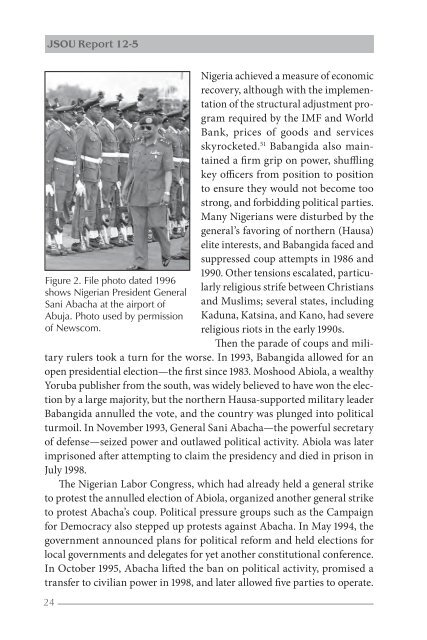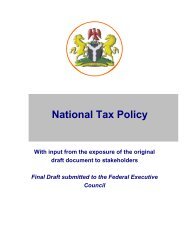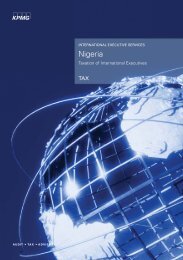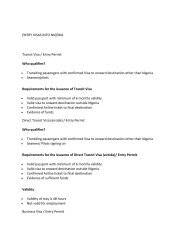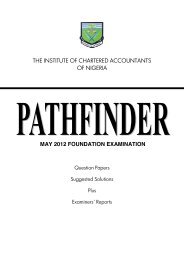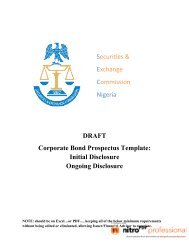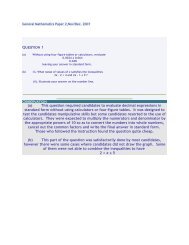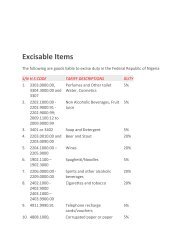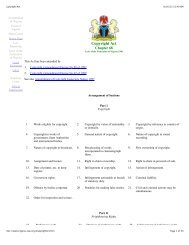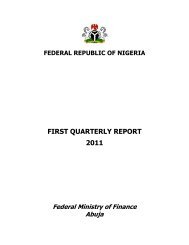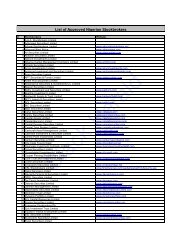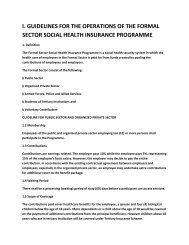Confronting the Terrorism of Boko Haram in Nigeria - Resourcedat
Confronting the Terrorism of Boko Haram in Nigeria - Resourcedat
Confronting the Terrorism of Boko Haram in Nigeria - Resourcedat
- No tags were found...
You also want an ePaper? Increase the reach of your titles
YUMPU automatically turns print PDFs into web optimized ePapers that Google loves.
JSOU Report 12-5Figure 2. File photo dated 1996shows <strong>Nigeria</strong>n President GeneralSani Abacha at <strong>the</strong> airport <strong>of</strong>Abuja. Photo used by permission<strong>of</strong> Newscom.24<strong>Nigeria</strong> achieved a measure <strong>of</strong> economicrecovery, although with <strong>the</strong> implementation<strong>of</strong> <strong>the</strong> structural adjustment programrequired by <strong>the</strong> IMF and WorldBank, prices <strong>of</strong> goods and servicesskyrocketed. 51 Babangida also ma<strong>in</strong>ta<strong>in</strong>eda firm grip on power, shuffl<strong>in</strong>gkey <strong>of</strong>ficers from position to positionto ensure <strong>the</strong>y would not become toostrong, and forbidd<strong>in</strong>g political parties.Many <strong>Nigeria</strong>ns were disturbed by <strong>the</strong>general’s favor<strong>in</strong>g <strong>of</strong> nor<strong>the</strong>rn (Hausa)elite <strong>in</strong>terests, and Babangida faced andsuppressed coup attempts <strong>in</strong> 1986 and1990. O<strong>the</strong>r tensions escalated, particularlyreligious strife between Christiansand Muslims; several states, <strong>in</strong>clud<strong>in</strong>gKaduna, Kats<strong>in</strong>a, and Kano, had severereligious riots <strong>in</strong> <strong>the</strong> early 1990s.Then <strong>the</strong> parade <strong>of</strong> coups and militaryrulers took a turn for <strong>the</strong> worse. In 1993, Babangida allowed for anopen presidential election—<strong>the</strong> first s<strong>in</strong>ce 1983. Moshood Abiola, a wealthyYoruba publisher from <strong>the</strong> south, was widely believed to have won <strong>the</strong> electionby a large majority, but <strong>the</strong> nor<strong>the</strong>rn Hausa-supported military leaderBabangida annulled <strong>the</strong> vote, and <strong>the</strong> country was plunged <strong>in</strong>to politicalturmoil. In November 1993, General Sani Abacha—<strong>the</strong> powerful secretary<strong>of</strong> defense—seized power and outlawed political activity. Abiola was laterimprisoned after attempt<strong>in</strong>g to claim <strong>the</strong> presidency and died <strong>in</strong> prison <strong>in</strong>July 1998.The <strong>Nigeria</strong>n Labor Congress, which had already held a general striketo protest <strong>the</strong> annulled election <strong>of</strong> Abiola, organized ano<strong>the</strong>r general striketo protest Abacha’s coup. Political pressure groups such as <strong>the</strong> Campaignfor Democracy also stepped up protests aga<strong>in</strong>st Abacha. In May 1994, <strong>the</strong>government announced plans for political reform and held elections forlocal governments and delegates for yet ano<strong>the</strong>r constitutional conference.In October 1995, Abacha lifted <strong>the</strong> ban on political activity, promised atransfer to civilian power <strong>in</strong> 1998, and later allowed five parties to operate.


